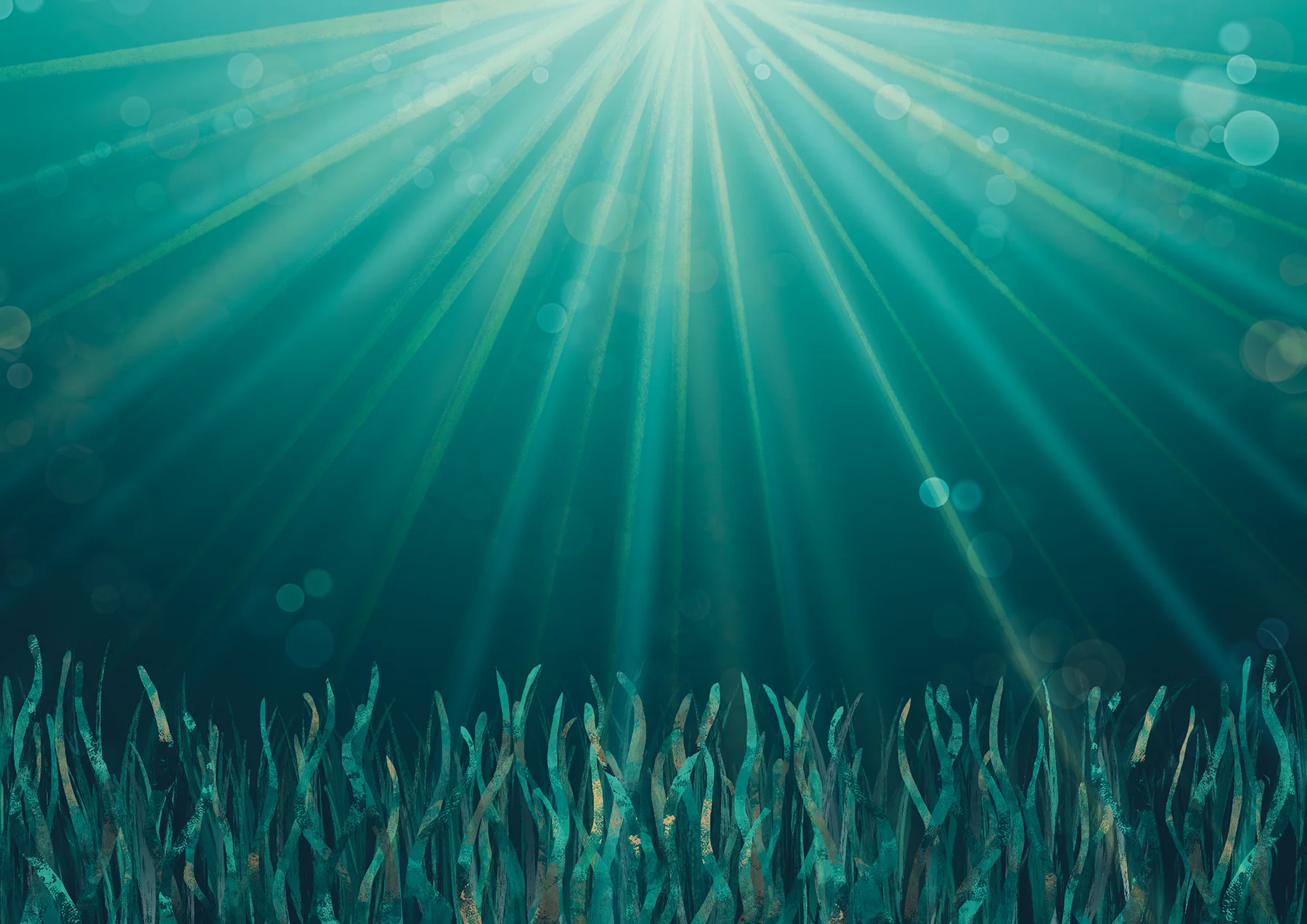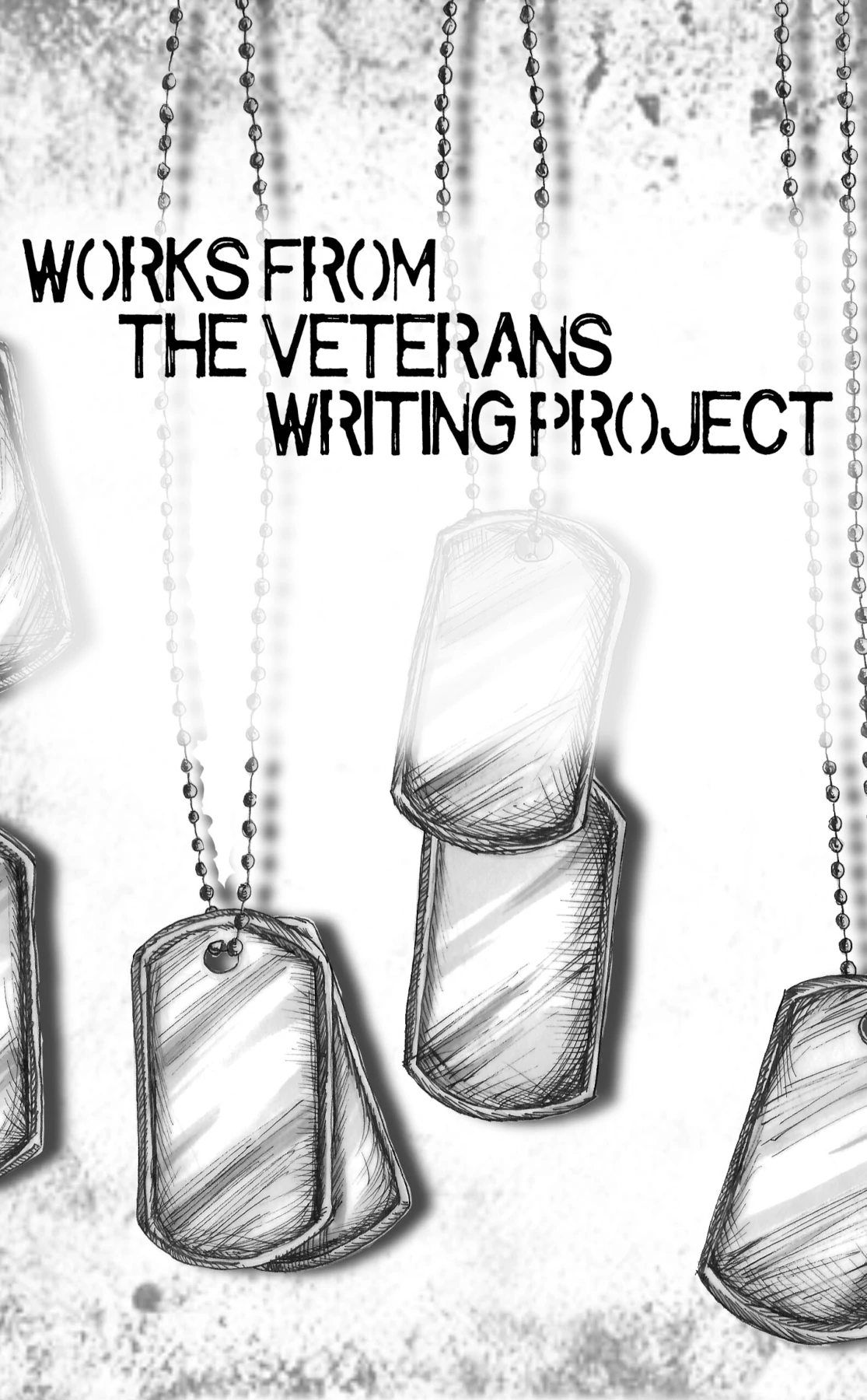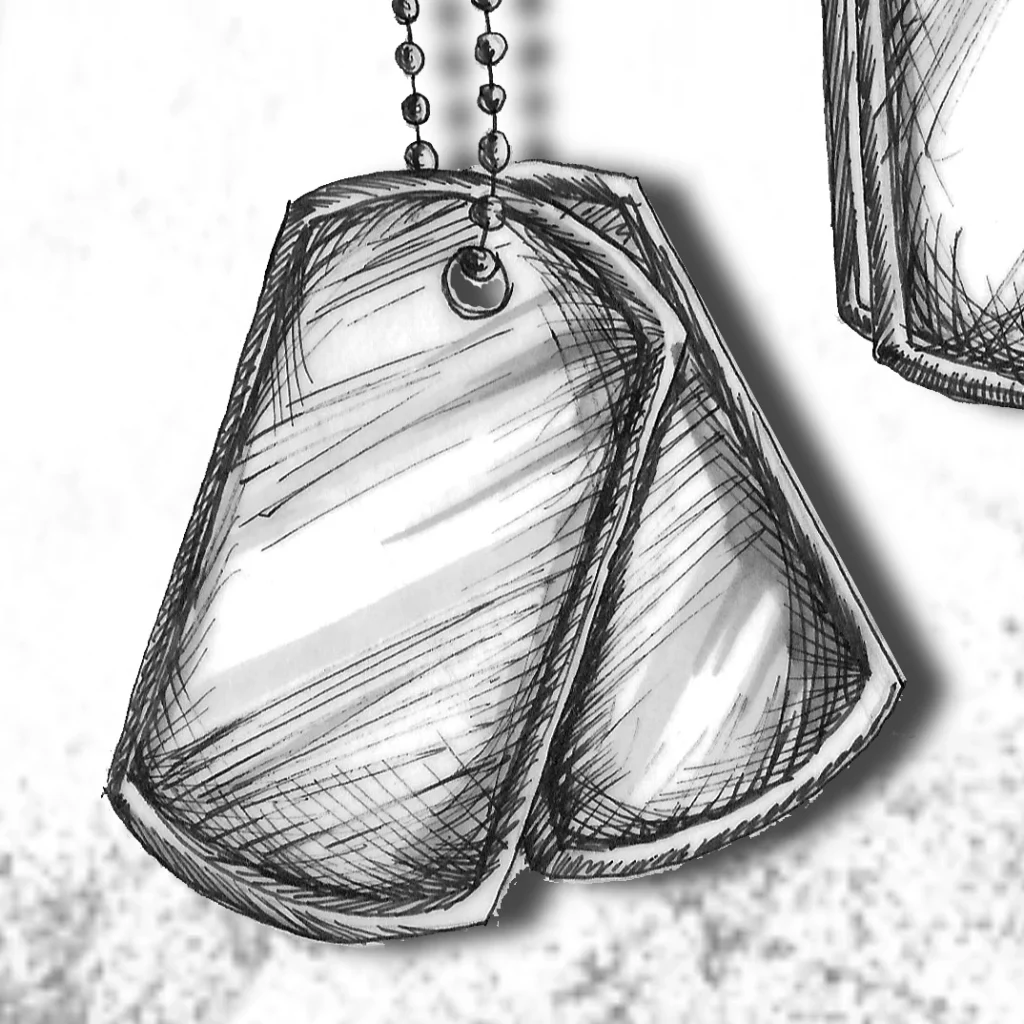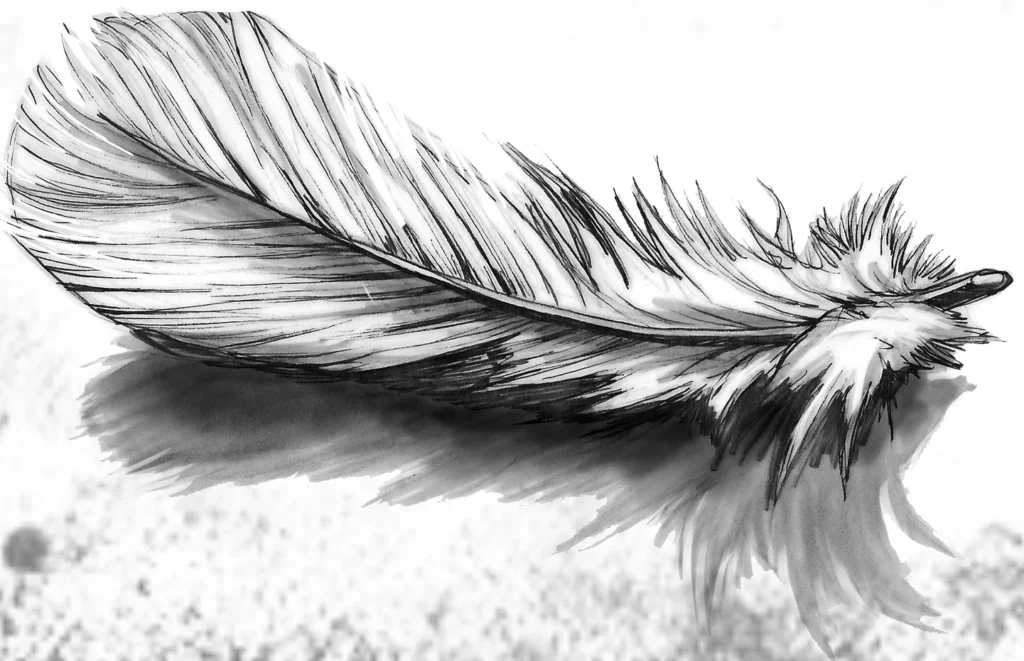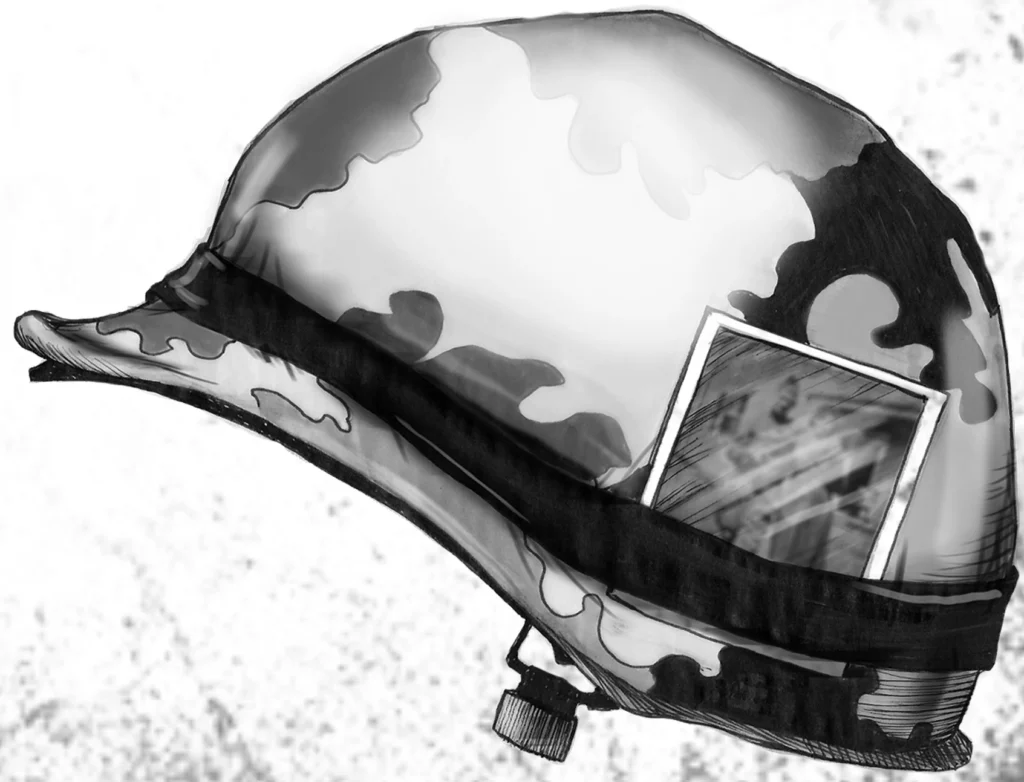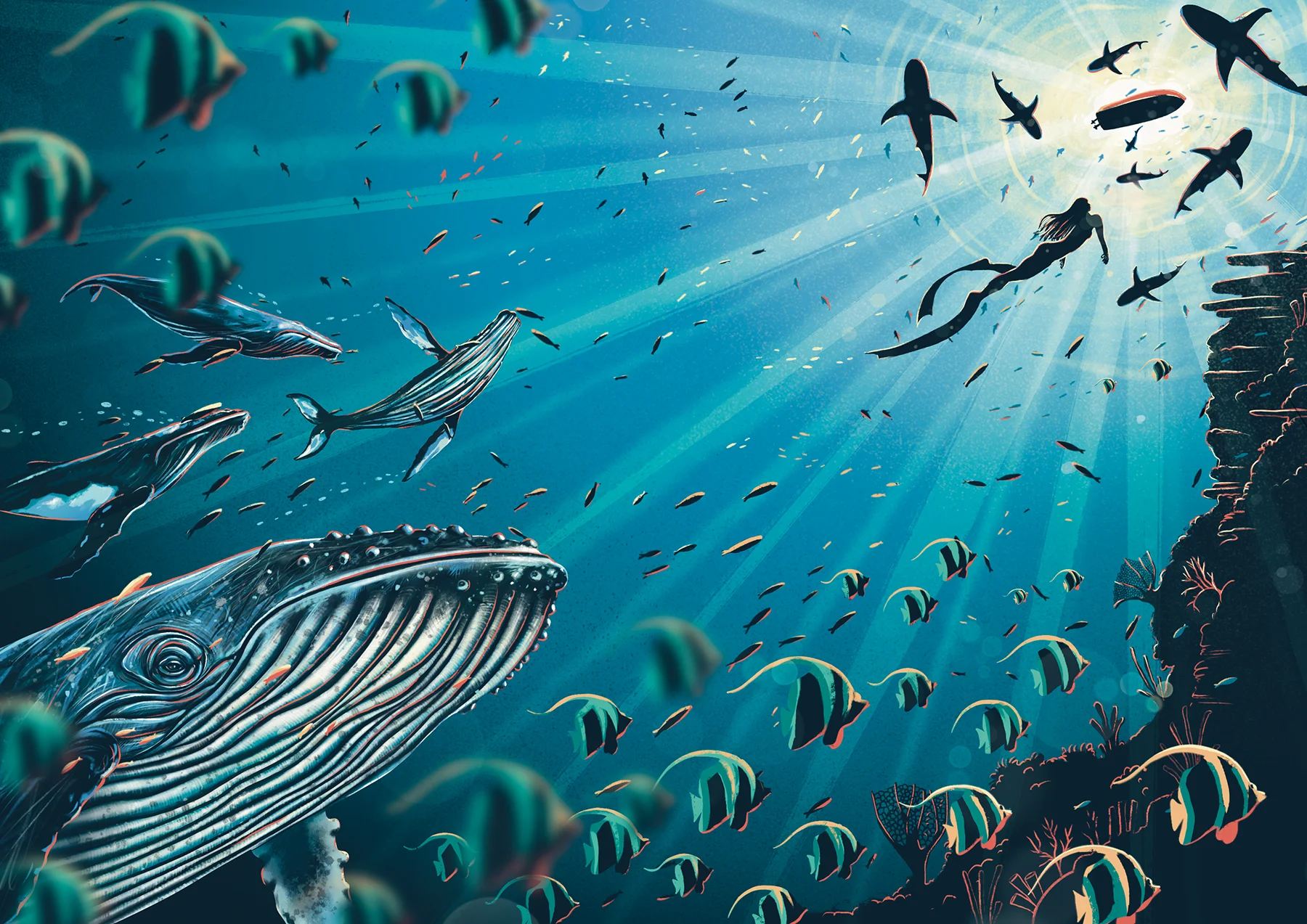
Beneath the Surface: A Community Feature with Ocean Culture Life
Ocean Culture Life (OCL) is dedicated to empowering a global community of ocean storytellers, advocates, and guardians to inspire, educate, and protect marine ecosystems. Aligned with the United Nations Sustainable Development Goal 14, their initiatives promote conservation and deepen public engagement with the ocean. Since becoming a registered charity in Jersey, the Channel Islands, in December 2022, OCL has hosted vibrant World Oceans Day celebrations and immersive educational workshops, fostering ocean literacy and collaboration with marine organizations. OCL also gives out over 30 storytelling grants a year, directly funding and supporting their storytelling community. By celebrating the ocean through the power of storytelling, OCL inspires a new generation of ocean storytellers, advocates, and guardians committed to preserving our coastal environments for future generations.
Battle of the Colors
by Francesca Page
Jet-black ink engulfs the emerald and marigold amphitheater as a young male Giant Cuttlefish flees, his bruised and scarred arms a testament to the battles fought for the survival of his kind. Gliding over the reef, he wears these wounds like badges of courage, marks of the relentless competition he faces to secure his legacy.
As the morning’s golden rays dance upon the frigid waters of South Australia, this underwater world stirs awake to a new day of battles, courtship, love, and heartbreak. Descending into this realm teeming with alien-like creatures, a drama as old as time, pulsing with the ocean’s heartbeat, the relentless struggle for love.
This seasonal fighter glides effortlessly over the reef, yesterday’s battles fading like a distant memory. Today brings new hopes as he stirs with quiet resolve, stretching his tentacles wide as dawn breaks through the water. Like a painter’s brushstroke on an ocean canvas, his body shimmers with purpose, pulsating in a hypnotic dance of blues, greens, and purples. He blends into his surroundings, shape-shifting with ease, his keen eyes sweeping for potential suitors. With each pulse and ripple, he prepares to captivate, conquer, and perhaps, finally meet her.
From above, a spotlight shines down on the reef, and nestled beneath the seaweed lies the female. Perfectly camouflaged in golden hues, she hovers silently, patiently waiting for him. Her beauty is unlike any other. Yet her allure has not gone unnoticed. She is surrounded by determined admirers, one, two, three… he loses count as she becomes engulfed by a kaleidoscope of pulsating colors. The heart knows what it wants, let the battle of the colors begin!
With purpose, he moves in, fixating on his beloved; the stage is set for an elaborate shape-shifting show. The largest admirer, looming like a spaceship above him, bellows a challenge, ready for battle. Like a well-rehearsed performance, these males adorn themselves in vibrant, elaborate costumes, each putting on the show of their lives and perhaps their last. The fight begins with a hypnotic dance; they whirl around each other, flaunting and stretching
their bodies to amplify their dominance and power in the water. He has waited too long to find her; this is a fight he cannot afford to lose. As the spectacle escalates, their bodies pulsate with mesmerizing swirls of white and orange, each determined to hypnotize, control, and ultimately win her.
His eyes dilate, intoxicated by love; he is transported into a trance. For a moment, he leaves his body, observing the battle from above, powerless in the face of defeat. Blinded by passion, he doesn’t see the larger male strike, driving a sharp blade into his vibrant armor. Abruptly, he awakens from his spell. With a heavy heart, he falters under the weight of his wounds. Retreating to the safety of the seaweed, he watches his love from afar. Yet, the call of love propels him forward. What he lacks in size, he makes up for in cunning; why fight when you can outsmart?
She locks eyes with him, trapped beneath a sea of unwanted males, her gaze silently beckoning him closer. It’s not size she desires, but intelligence, and he knows exactly what to do. With calculated precision, he employs a clever strategy, slipping in undetected as he masquerades as a female, altering his colorful armor and retracting his tentacles. Like a shadow, he glides beneath the larger males, evading their notice until he finally reaches her side.
Gently, he extends one of his arms to touch her, and her eyes speak a thousand words of passion. Their arms intertwine, head to head, heart to heart, an embrace that signifies the beginning of new life and the survival of their species. In this moment, the chaotic world around them fades away; all that exists is the delicate bond between two Giant Cuttlefish and the promise of their shared legacy, where intelligence wins.
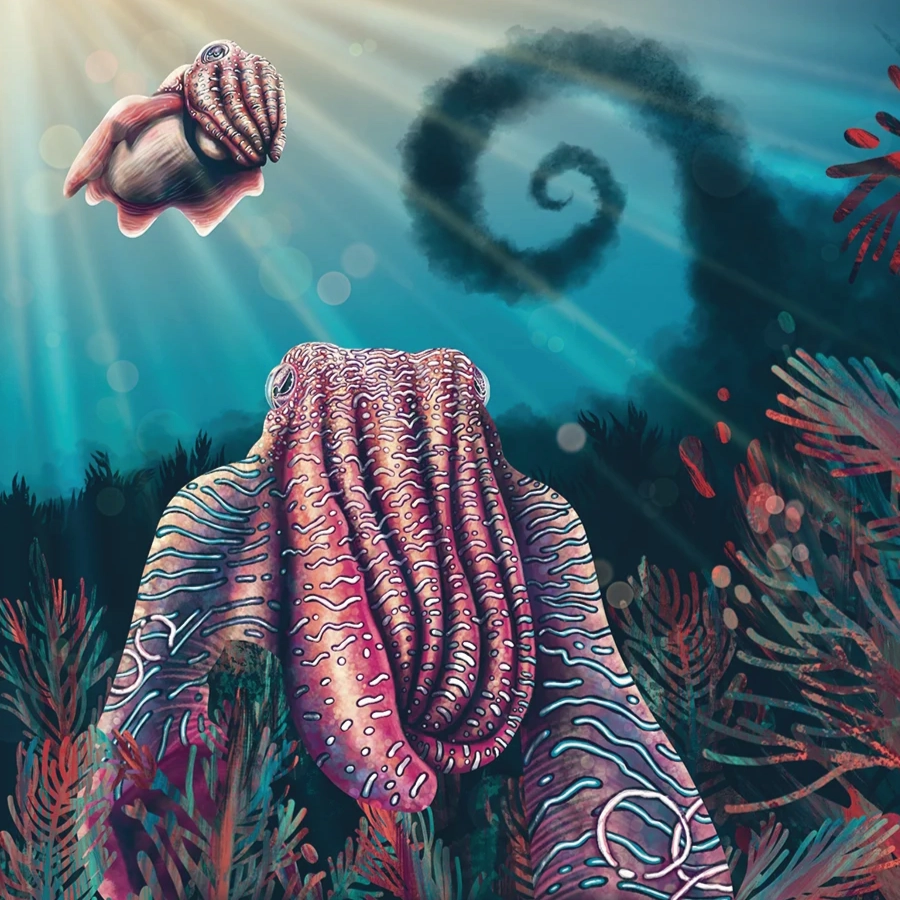
Learning to Swim
by Maddy Bolt
I have learned a lot since first landing in Indonesia six years ago. I’ve learned how to ask for a nasi goreng in Bahasa, how to navigate down a dusty hill on a motorbike with a passenger and two surfboards, and how to tell if the tide will be too low to surf. However, something I took for granted was already knowing how to swim. I barely even remember learning! My faintest memory of learning how to swim, was being told to act like a starfish while attempting to float—at the tender age of five years old. This experience was something I took for granted—until I moved to Indonesia.
Despite spending almost every day in the water, I can count on one hand the number of local women I had seen surfing. Now living in Indonesia part-time and surfing almost daily, I continued to wonder about this. Were local women interested in surfing but just not participating? Or was I projecting my own “western” assumptions onto a community that might not share the same interest in the ocean?
I decided to find out the answer. I turned to Misel, a close local friend of mine. She managed one of my favorite local restaurants in town and we had gotten to know each other drinking many coffees over the years. When I asked her if she was interested in something like surfing, her eyes immediately lit up and she said, “Surfing?! That is my dream. Of course I want to surf.” At least for Misel, it was not a question of having interest.
When I probed her further and asked whether other local women felt the same way, she added exuberantly, “Many of my friends would love to surf! That is something we have only dreamt of doing!” Interesting, I thought, “So why have you not taken the leap to learn?” Misel laughed and said, “Well first we would have to learn how to swim!” This is where I had to check my privilege. I had assumed most of these women had grown up swimming since they lived on an island.
What I later realized, is that despite being in their mid-thirties and growing up in sight of the water their whole lives, many of the local women had never even been in the ocean past their knees. This was due to a myriad of reasons, from a general lack of time due to childcare responsibilities, local folklore stigmatizing the ocean as evil, and parents instilling fear in their young daughters in order to protect them. While this fear worked to keep women away from the ocean, it worked against their favor in dire situations.
Drowning is the third leading cause of unintentional injury death in the world, and one of the leading causes of accidental death in Indonesia. Children are especially at risk, since women, who are the primary caregivers to their families, are unable to swim and save those that have been swept away by currents or rogue waves.
This is where the idea for OceanFolx began. In partnership with Misel and a few other local femme leaders in the community, we spent the next year building and starting a swimming, ocean safety, and surfing program. We aim to prevent drowning through a ripple effect. We empower local women by teaching them essential swimming skills, ocean safety, and life-saving techniques. For those who want to go further, we have started an introductory surf program once they’ve mastered adequate swimming and water safety skills. Our program goes beyond basic training by including a leadership component, which equips these women with the tools and confidence to pass these skills on to their children, families, and communities. This approach not only amplifies their impact but also fosters a broader culture of safety and knowledge.
Through our initiative, we empower women, inspire local leadership, and promote environmental stewardship. By encouraging more time spent in and around the ocean, we help transform their relationship with the environment from one of fear to one of positive engagement and respect. Our program brings women together, creating a supportive community where they can empower each other and interact with the ocean in a safe and meaningful way.
In 2025, we will be running our second year of programming. Misel has come a long way and is now working as our local program coordinator. She recruits new students to our non-profit program and is working to become a swim teacher with us. We are committed to empowering more women through our comprehensive swim training program, guiding them all the way to becoming certified swim teachers. Our vision extends beyond our current reach; we aspire to expand our impact by introducing our programs to the neighboring island of Sumbawa and by launching exciting, new at-sea sailing programs. By donating, you can help us provide life-changing opportunities and build a brighter future for the women in our community.
Throughout this journey, I continue to be humbled and inspired every day by Misel and each and every one of our students. It has been incredibly rewarding to share my knowledge and watch our local women step up as leaders, ready to become the next OceanFolx teachers as I transition into a supportive role. Watching them float and telling each other to act like a “bintang-laut,” starfish in Bahasa, brings the biggest smile to my face—and all the hard work feels worth it.
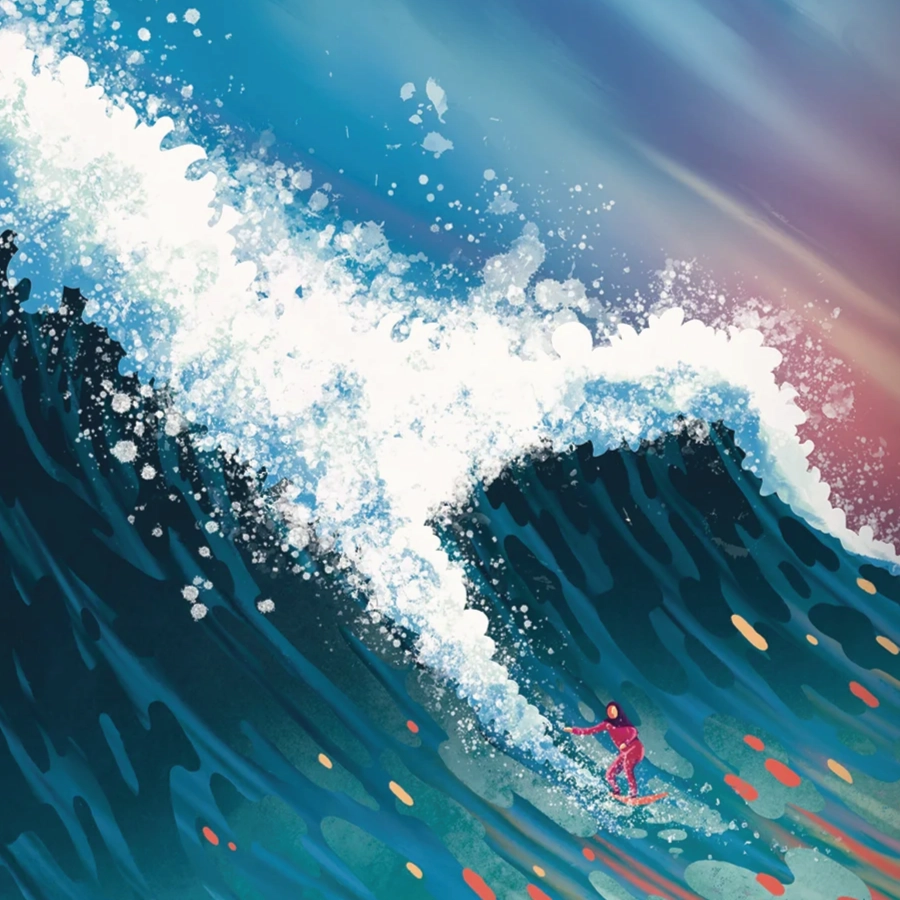
The Sea Inside Ourselves Is Showing
by Jillian Nettels
Does the darkness hold light in abeyance?
How waves pulse between blurred edges defy.
Emboldened by revealing raw moments,
Glisten as we listen to the sky.
Our gazing is a tether in vast spaces,
Radiate a secret silent knowing,
As reflections on rippling places,
That the sea inside ourselves is showing.
Waters linger in a lonely abyss,
In the dark depths we share suffused longing
for our promised presence of Neptune’s bliss.
In remembrance of Day’s vanishing
the Night has taken form from holding breath,
That Life is a reckoning with Death.
The sea inside ourselves is knowing.
The sea inside ourselves is showing.
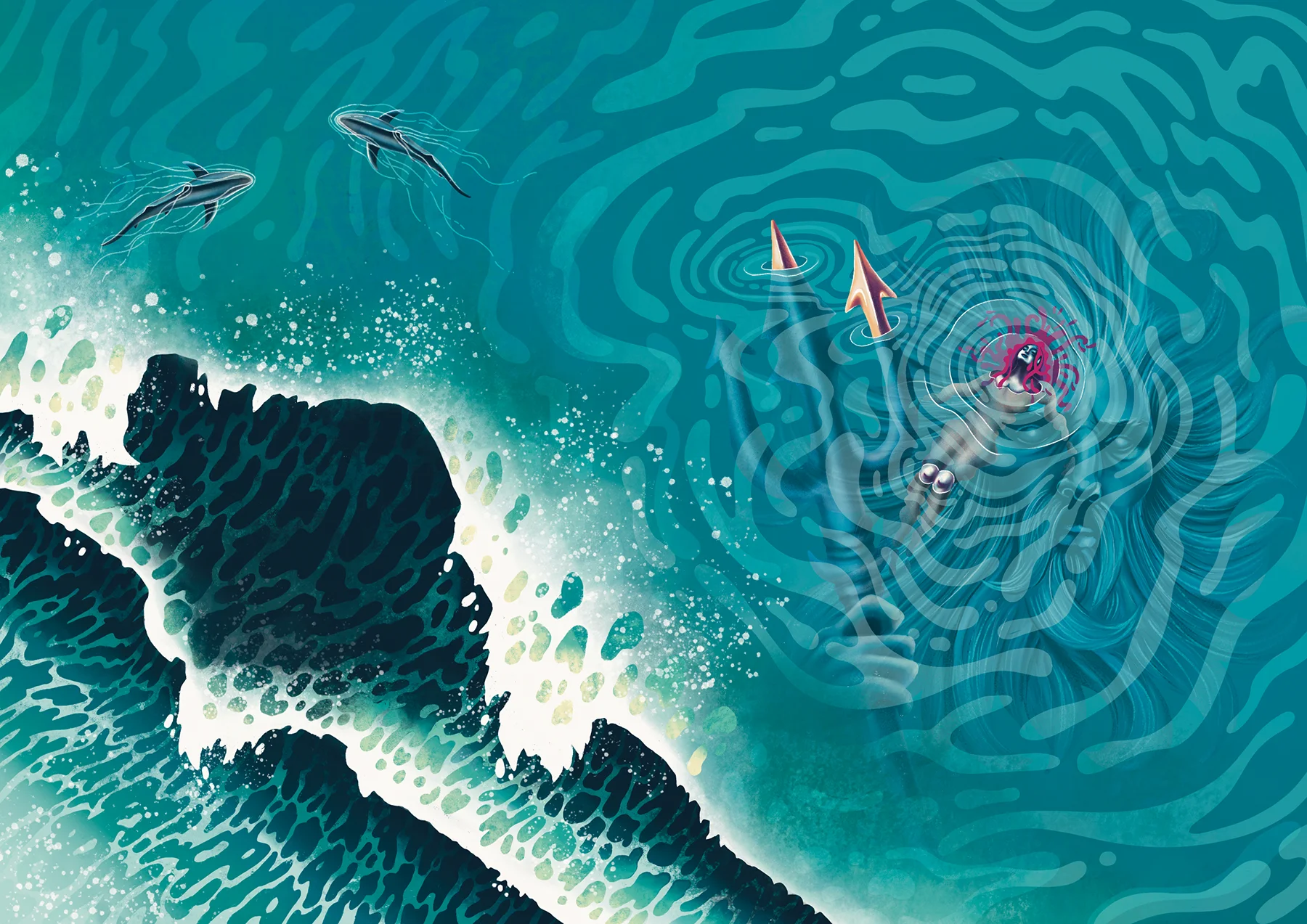
Ancient Waters, Modern Warnings: A Scientist’s Love Letter to the Mediterranean
by Arzucan “Zuzu” Askin
The Mediterranean Sea, with its startlingly blue depths and storied coastline, has a unique claim on my heart. As a child, I spent endless summer days diving into these fabled waters, searching for ancient treasures that seemed to whisper through the currents. My quarry wasn’t only shells and smooth stones; I was entranced by the seagrass meadows and the centuries-old amphoras hidden beneath the waves. Each dive was an act of discovery, a glimpse into the world of sailors and merchants from millennia past. I learned early on that the Mediterranean was no mere sea, but a bridge between human history and the wild mystery of the ocean.
From my very first encounter with those seagrass meadows—fields of Posidonia stretching across the seafloor like vast, verdant carpets—I was struck by the way these delicate green strands seemed to breathe life into the water. Posidonia meadows are among the most productive ecosystems on Earth, sequestering carbon, nurturing young marine life, and filtering water. These fields of seagrass became sacred places for me, sites of personal pilgrimage and discovery. They felt as much a part of Greek mythology as the stories of Odysseus and the sea gods.
Diving down after hearing my mother’s tales of the sea, I would imagine I was in the lair of Poseidon himself. The seagrass swayed like dancers in tune with his trident’s rhythms, and around me, I felt the presence of forgotten legends: ancient gods, sirens, and the creatures of maritime folklore. For thousands of years, the Mediterranean has held sway over human imagination. This was a sea that demanded respect, a wild place of tempestuous tides and lurking mysteries—a gateway between the known world and realms beyond.
The Mediterranean shaped me as a scientist, teaching me to observe, to ask questions, and to see the world as an intricate puzzle of ecosystems and cultural histories. It has shaped the way I approach conservation today— interdisciplinary, grounded in tradition yet open to innovation, and inclusive of multiple perspectives. As someone who grew up between cultures, I found that the Mediterranean offered a unique bridge between worlds: East and West, ancient and modern, wild and human. Its diversity, both ecological and cultural, reflects how deeply connected the ocean is to human identity. This sea instilled in me the importance of understanding not just the science of ecosystems, but the people, practices, and stories intertwined with them.
In many ways, the Mediterranean sharks I now study serve as symbols of this delicate balance between the wild and the human. Ancient Greeks feared and revered these apex predators, folding them into myths and maritime tales, from the great white to the angelshark. Yet today, many of the sharks of the Mediterranean are critically endangered, their numbers dwindling to a fraction of what they once were. Driven by overfishing, habitat loss, and the pressures of a warming sea, the decline of Mediterranean sharks is a devastating loss—not only of biodiversity but of living history. We are watching the unraveling of a story that has been unfolding for millions of years, and with it, a part of our collective human heritage.
Today, however, the Mediterranean is also a frontline for climate change. Rising sea temperatures, invasive species, and acidification are reshaping the delicate balance that has persisted here for thousands of years. The Mediterranean is warming 20% faster than the global average, putting ancient Posidonia meadows, the lungs of the sea, under grave threat. For those of us who see the Mediterranean as both a living ecosystem and a cultural cornerstone, the stakes are heartbreaking. It has always been a body of water that mirrored the ebbs and flows of human civilization, from trade routes to warfare, and now it has become an early warning system for the entire planet.
The changes sweeping through the Mediterranean Sea are not isolated—they’re ripples, harbingers of transformations reaching far beyond its shores. Invasive species from warmer waters have already begun to push out native species, with entire food webs restructured in ways we are only beginning to understand. For me, the Mediterranean’s transformations have always felt deeply personal, as though the very threads of my own connection to this sea are fraying, one species or seagrass meadow at a time.
As the Mediterranean changes, so do the traditional ways of life it has supported for centuries. Artisanal fishers, once in harmony with the seasons and the migrations of fish, now grapple with empty nets and foreign species disrupting their catch. The loss of biodiversity is not just about numbers; it is the erosion of a relationship, a rhythm of life that has evolved over thousands of years. We are losing not only wildlife but our traditional ways of being, our connection to place and to the ancient wisdom of those who lived in harmony with the sea long before us.
In global conversations about ocean conservation, the Mediterranean often finds itself overlooked. Perhaps it is due to its proximity to bustling civilizations, or maybe it’s because its compact size contrasts with the vastness of the Pacific or the Atlantic. Yet the Mediterranean remains one of the most biodiverse seas in the world. Here, species adapted to the rugged conditions of a semi-enclosed sea flourish, from seahorses hiding in meadows to groupers and tuna patrolling rocky reefs. This sea has borne witness to everything from massive migrations of bluefin tuna to the tiny nudibranchs that cloak its rocky shores in vibrant hues. The Mediterranean has long been a paradox: a relatively small, seemingly tame sea, yet brimming with an almost mythical intensity.
The Mediterranean taught me to look at the ocean as a tapestry, woven of both natural and cultural threads. As an interdisciplinary scientist, I now work to bridge the gap between these worlds, to merge science with storytelling and tradition with technology. The Mediterranean’s deep past, where sharks swam freely, where seagrass meadows grew untouched, continues to guide me as I navigate today’s conservation challenges across cultures and disciplines. This sea, this teacher, is not just a reminder of the beauty we stand to lose but of the resilience we can find—if we learn to listen to the stories that have always flowed through its waters.
The Mediterranean’s history is written not only into the marble walls of temples, or into folklore, but into its ecosystems, from the green seagrass meadows to the large whales. We are at a crossroads, and over the next decade we must decide what we want the Mediterranean’s story to become. This body of water has been humanity’s compass for thousands of years; by protecting its biodiversity, we are also protecting the cultures that call it home. In saving the Mediterranean, we are saving a piece of ourselves—our history, our future, and our enduring connection to the ocean.
